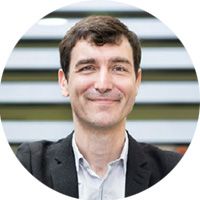Interview : Brice Laurent, Director of the Social Sciences, Economics & Society Department

Strengthening the Agency’s expert appraisals through dialogue.
What are the ambitions of ANSES’s new Social Sciences, Economics & Society Department?
For a number of years now, the Agency has wanted to increase momentum and strengthen its skills in the human sciences. The aims are to gain a better understanding of the impact of economic and so - cial factors on risk exposure, and develop methods to improve the analysis of situations marked by uncertainty or controversy. The department, which was created in 2022 from a pre-existing core of skills, now has a dozen people, including economists, sociologists and political scientists. We have also set up an expert committee specialising in socio-economic analysis, Brice Laurent Director of the Social Sciences, Economics & Society Department Strengthening the Agency’s expert appraisals through dialogue. Interview which operates like all the other external ex - pert committees working on risk assessment at ANSES. Methodological work is under way to develop benchmarks and define best prac - tice in the field of socio-economic analysis, for example in assessments of the socio-economic determinants of exposure to risk factors, eco - nomic assessments of the health burden or the analysis of different management options. The aim is not to take the place of the authorities but to provide them with the most robust evi - dence possible on which to base their decisions. In each case, the economic and social sciences help explore the scope of possibilities in order to fuel public debate.
How can work in the economic and social sciences strengthen expert appraisal at ANSES?
The work carried out by ANSES raises economic and social issues and is linked to societal choices and debates that often go beyond the ques - tion of risk: the opportunities offered by new technologies such as 5G, changes in agricultural models, etc. Climate change also raises crucial questions about inequalities in exposure, tech - nologies for adaptation or limiting emissions, analysis of vulnerabilities, etc. In this context, ex - pert appraisal work in the economic and social sciences is carried out in all the Agency’s fields, sometimes under the department’s direct su - pervision – for example on the use of copper in agriculture – with methodological development work on the analysis of alternatives. We also pay close attention to emerging issues. As part of the new mandate on biotechnology entrusted to ANSES, we are taking part in an expert appraisal on new genome-editing tech - niques and their application to plants. We are also supporting a research project on the eco - system services provided by pollinators, in order to assess sources of vulnerability and develop new analytical approaches. Lastly, the economic and social sciences more generally help us better understand and deci - pher controversies related to ANSES’s activities, monitor their evolution and draw lessons from them in order to improve our practices.
How can it maintain and reinforce dialogue with stakeholders?
We coordinate four committees and platforms for dialogue with stakeholders specific to ANSES. The aim is to establish quality dialogue on the Agency’s work, ensuring that a diversity of opinions is expressed, thereby helping to generate constructive public debate. In setting up the “Biotechnology, environment and health” dialogue committee, which was inaugurated last October, it was essential to maintain a balance in the representation of professional players and associations from the agricultural and medical worlds. The aim was to go beyond taking sides and delve deeper into positions that are often more complex. Generally speaking, we always strive to reconcile dialogue and expertise. Collective expert ap - praisals are based on a rigorous methodological framework and an analysis of the declared inte - rests of the scientific experts. We are convinced that we can strengthen the Agency’s expertise through dialogue, while maintaining our high standards of independence. We would like to make even greater use of dialogue forums than we do today. Participatory research is another promising avenue that we are exploring, with, for example, the identification of environmental and health signals.
- Back to 2022 annual report